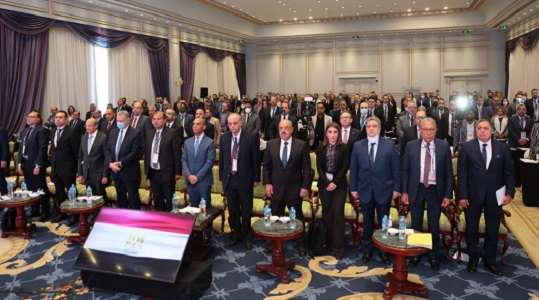The Secretary-General of the Union of Arab Chambers, Dr. Khaled Hanafi, considered that the impact of the Russian-Ukrainian war has cast a shadow on the global economy, while the world has not yet recovered from the impact of the Corona pandemic.
He explained that the Arab world is an integral part of the global economy, and there is certainly a direct and indirect impact on the Arab countries, he stressed that "about 25 percent of the global food basket comes from Russia and Ukraine." Considering that "the result of the ongoing war will have a significant impact on global supply chains, which will lead to a rise in food prices just as global oil prices have risen."
He said: "Until now, Arab food security has not been significantly affected, since most Arab countries, including Egypt, possess an important stockpile of wheat, corn and other vital materials that affect the livelihood of Arab and Egyptian citizens in the first place, but if the war continues for a longer time, the repercussions of the Russian-Ukrainian war will have a great impact on our Arab world."
Hanafi’s words came during his participation in the “Future of Small and Medium Enterprises: Vision 2030” conference, which was held in Luxor in the Arab Republic of Egypt, organized by the Union of Arab Banks, and sponsored by the Central Bank of Egypt.
Hanafi stressed that "the world will witness, because of the ongoing war, an inflationary recession that has not been witnessed before, and the treatment of this inflationary depression will not be through aggregate demand. Also, the central banks' setting of new monetary policies may create more inflation and will not, therefore, create more jobs, which will negatively affect the reality of economic growth in all countries of the world, including the Arab countries and the Arab Republic of Egypt."
He said: “There is no doubt that small and medium enterprises will be affected by the reality of the war, as these projects are closely linked to the reality of the total supply, as about 97 percent of companies in our Arab world are small and medium companies. They are concentrated in the trade and services sectors, which were the sectors most affected by the repercussions of the pandemic. These institutions employ about 50 percent of the total workforce in the Arab world, while their contribution to the gross domestic product ranges between 25 and 30 percent, which is considered a modest contribution. Hence the importance of supporting these projects by banks, within well-thought-out plans that take into account the feasibility of the projects and note, in turn, the importance of training and qualification for employees, which ultimately contributes to raising the efficiency of these projects, and is positively reflected on the macroeconomic reality.” Hanafi explained that "the volume of liquidity provided by Arab central banks to face the repercussions of Covid-19 amounted to about $125.2 billion, of which 11.4 percent were for small and medium enterprises, compared to $9224.7 billion globally."
He added that the government's financial support and offerings to all Arab countries to confront the pandemic amounted to $95.2 billion. That is, about 4 percent of the gross domestic product, compared to 23 percent globally, where the percentage of applications for small and medium-sized enterprises constituted only 19.5 percent of the total government applications.
Hanafi called for the extension and expansion of support for small and medium-sized companies by extending tax exemptions and loan repayments, providing wage subsidies to maintain them, and improving access to finance, especially the trade and service sectors that make up a large proportion of small and medium-sized enterprises. He said that what is required is to redraw tax policies to promote digital and sustainable economic transformation and to provide decent work for all, develop a public investment strategy to promote inclusive and sustainable growth, address structural weaknesses, diversify government revenues, and improve operational financial management.
He called for “activating the work of the draft indicative charter for the development of the small, medium and micro enterprises sector, which was adopted by the Arab Development Summit held in Beirut in 2019, which aims to promote this sector, achieve economic integration in the Arab countries and create competitive advantages.” He stressed that “this issue is at the core of the Union of Arab Chambers' concerns, and our focus is on pioneering, digital and social business projects for Arab youth. We have launched many initiatives in this field, the most important of which is the launch of the "Arab Rally" competition, scheduled to be held at the end of March within the framework of the Dubai Expo. Establishing and operating centers in a number of Arab chambers to support entrepreneurship and innovation, in addition to implementing training and other qualification programs.”
Source (Union of Arab Chambers)

